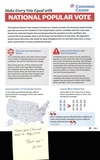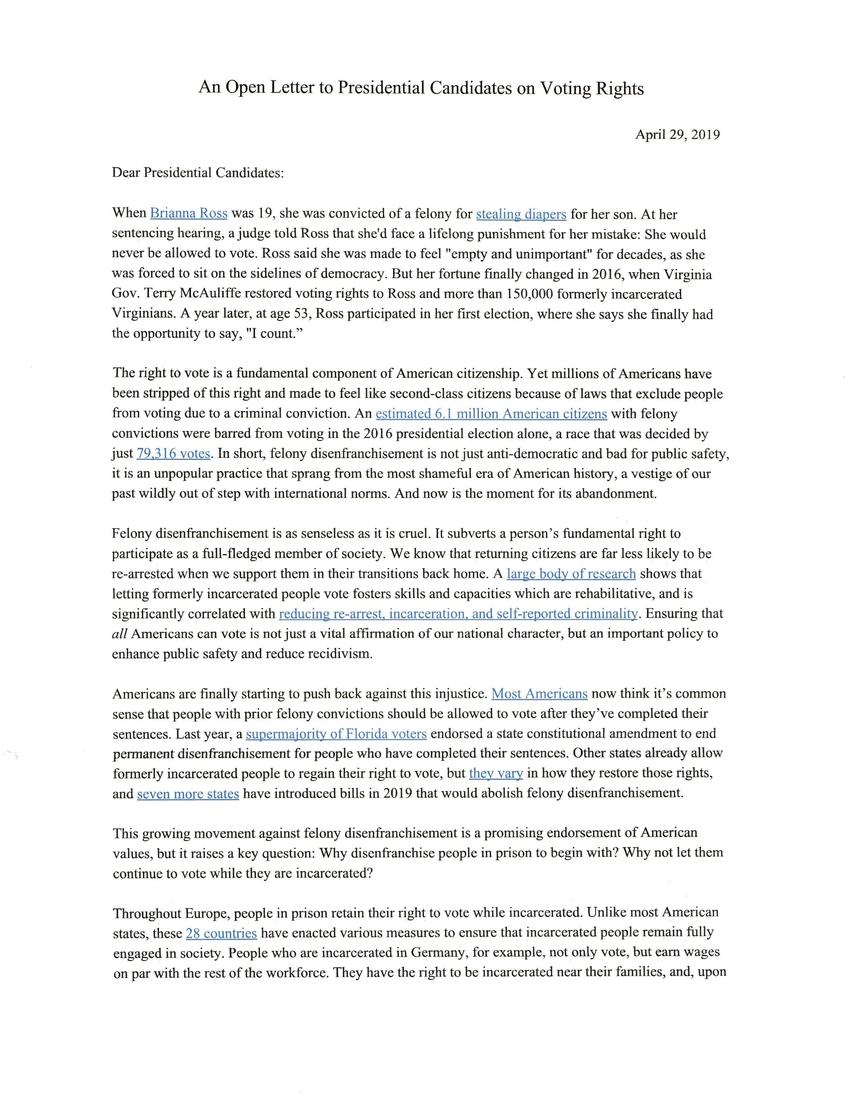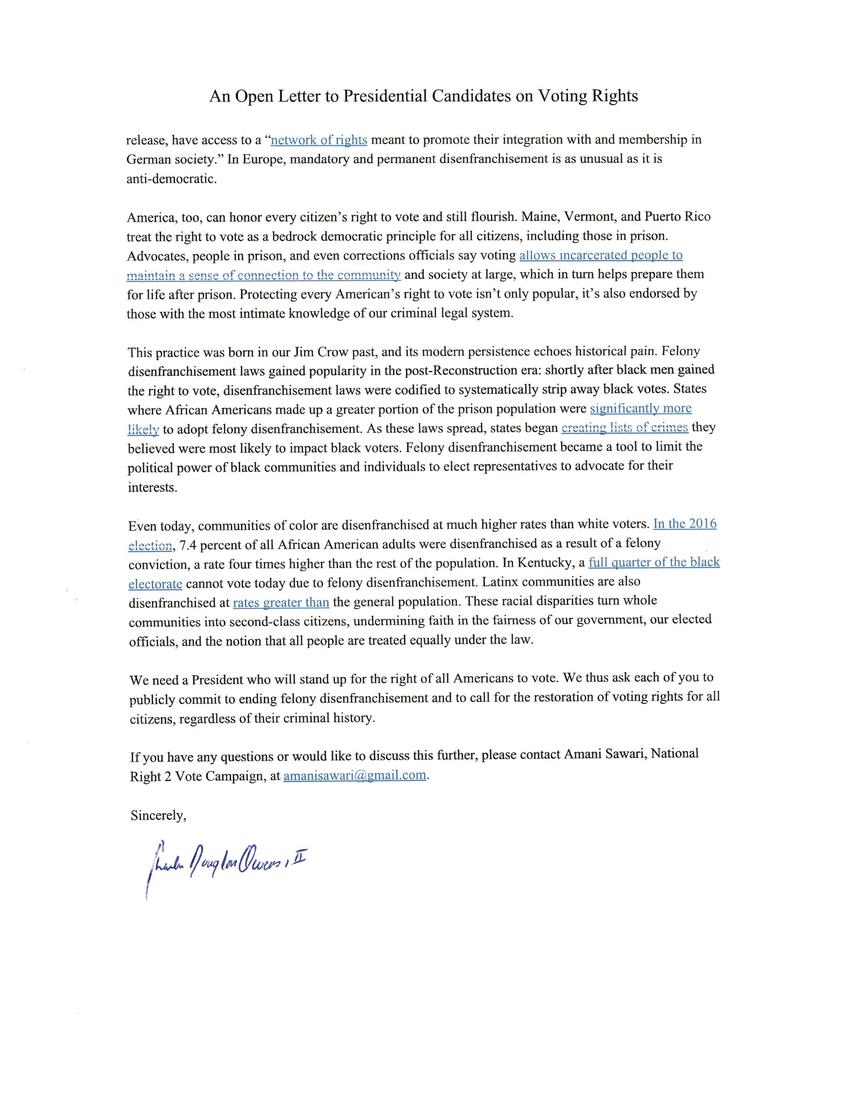
Transcription
An Open Letter to Presidential Candidates on Voting Rights
April 29, 2019
Dear Presidential Candidates:
When Brianna Ross was 19, she was convicted of a felony for stealing diapers for her son. At her sentencing hearing, a judge told Ross that she'd face a lifelong punishment for her mistake: She would never be allowed to vote. Ross said she was made to feel "empty and unimportant" for decades, as she was forced to sit on the sidelines of democracy. But her fortune finally changed in 2016, when Virginia Gov. Terry McAuliffe restored voting rights to Ross and more than 150,000 formerly incarcerated Virginians. A year later, at age 53, Ross participated in her first election, where she says she finally had the opportunity to say, "I count."
The right to vote is a fundamental component of American citizenship. Yet millions of Americans have been stripped of this right and made to feel like second-class citizens because of laws that exclude people from voting due to a criminal conviction. An estimated 6.1 million Americans with felony convictions were barred from voting in the 2016 presidential election alone, a race that was decided by just 79,316 votes. In short, felony disenfranchisement is not just anti-democratic and bad for public safety, it is an unpopular practice that sprang from the most shameful era of American history, a vestige of our past wildly out of step with international norms. And now is the moment for its abandonment.
Felony disenfranchisement is as senseless as it is cruel. It subverts a person's fundamental right to participate as a full-fledged member of society. We know that returning citizens are far less likely to be re-arrested when we support them in their transitions back home. A large body of research shows that letting formerly incarcerated people vote fosters skills and capacities which are rehabilitative, and is significantly correlated with reducing re-arrest, incarceration, and self-reported criminality. Ensuring that ALL Americans can vote is not just a vital affirmation of our national character, but an important policy to enhance public safety and reduce recidivism.
Americans are finally starting to push back against this injustice. Most Americans now think it's common sense that people with prior felony convictions should be allowed to vote after they've completed their sentences. Last year, a supermajority of Florida voters endorsed a state constitutional amendment to end permanent disenfranchisement for people who have completed their sentences. Other states already allow formerly incarcerated people to regain their right to vote, but they vary in how they restore those rights, and seven more states have introduced bills in 2019 that would abolish felony disenfranchisement.
This growing movement against felony disenfranchisement is a promising endorsement of American values, but it raises a key question: Why disenfranchise people in prison to begin with? Why not let them continue to vote while they are incarcerated?
Throughout Europe, people in prison retain their right to vote while incarcerated. Unlike most American states, these 28 countries have enacted various measures to ensure that incarcerated people remain fully engaged in society. People who are incarcerated in Germany, for example, not only vote, but earn wages on par with the rest of the workforce. They have the right to be incarcerated near their families, and, upon release, have access to a "network of rights meant to promote their integration with and membership in German society." In Europe, mandatory and permanent disenfranchisement is as unusual as it is anti-democratic.
America, too, can honor every citizen's right to vote and still flourish. Maine, Vermont, and Puerto Rico treat the right to vote as a bedrock democratic principle for all citizens, including those in prison. Advocates, people in prison, and even corrections officials say voting allows incarcerated people to maintain a sense of connection to the community and society at large, which in turn helps prepare them for life after prison. Protecting every American's right to vote isn't only popular, it's also endorsed by those with the most intimate knowledge of our criminal legal system.
This practice was born in our Jim Crow past, and its modern persistence echoes historical pain. Felony disenfranchisement laws gained popularity in the post-Reconstruction era: shortly after black men gained the right to vote, disenfranchisement laws were codified to systematically strip away black votes. States where African Americans made up a greater portion of the prison population were significantly more likely to adopt felony disenfranchisement. As these laws spread, states began creating lists of crimes they believed were most likely to impact black voters. Felony disenfranchisement became a tool to limit the political power of black communities and individuals to elect representatives to advocate for their interests.
Even today, communities of color are disenfranchised at much higher rates than white voters. In the 2016 election, 7.4 percent of all African American adults were disenfranchised as a result of a felony conviction, a rate four times higher than the rest of the population. In Kentucky, a full quarter of the black electorate cannot vote today due to felony disenfranchisement. Latinx communities are also disenfranchised at rates greater than the general population. These racial disparities turn whole communities into second-class citizens, undermining faith in the fairness of our government, our elected officials, and the notion that all people are treated equally under the law.
We need a President who will stand up for the right of all Americans to vote. We thus ask each of you to publicly commit to ending felony disenfranchisement and to call for the restoration of voting rights for all citizens, regardless of their criminal history.
If you have any questions or would like to discuss this further, please contact Amani Sawari, National Right 2 Vote Campaign, at amanisawari@gmail.com.
Sincerely,
Charles Douglas Owens, II
Other posts by this author
|
2023 may 31

|
2023 mar 20

|
2022 aug 23

|
2022 aug 23

|
2022 aug 23

|
2022 aug 23

|
More... |



Replies